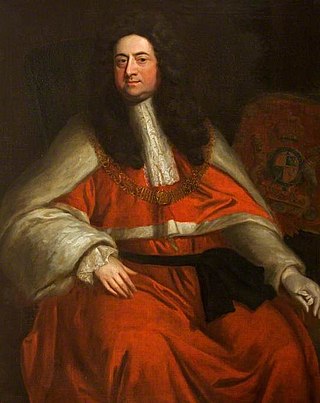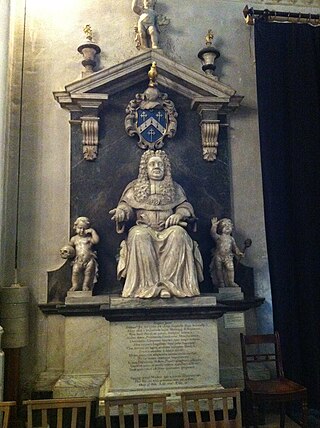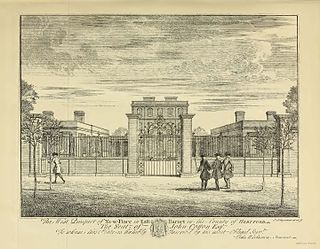
Sir John Willes was an English lawyer and politician who sat in the House of Commons from 1724 to 1737. He was the longest-serving Chief Justice of the Court of Common Pleas since the 15th century, serving 24 years.

Sir Robert Eyre was an English lawyer and Whig politician who sat in the English and British House of Commons from 1698 to 1710. He served as Solicitor-General and then as a judge, and ultimately as Chief Justice of the Common Pleas.
The Hon. Edward Mayne was Judge of the Court of Common Pleas of Ireland (1805–1816) and afterwards Judge of The Court of the King's Bench (1816–1818).
Sir Thomas Abney was an English barrister and later judge. He was baptized at Willesley, Derbyshire on 30 April 1691 and was the younger son of Sir Edward Abney, by his second wife, Judith, daughter and co-heir of Peter Barr, of London.

Philip Tisdall SL was an Irish lawyer and politician, who held the office of Attorney-General for Ireland. He was for many years a leading figure in the Irish Government.
Baron Sir Thomas Street, MP, KB, JP was an English judge and politician who became a Baron of the Exchequer in 1681. He represented Worcester in the House of Commons between 1659 and 1679. In 1667, he became the Mayor of Worcester, as his father had been before him. In 1677, he became the Chief Justice of Brecknock, Glamorgan and Radnor.
Henry Hene or Henn was an English-born judge who had a distinguished career in Ireland, and held the office of Chief Baron of the Irish Exchequer.

John Bathe was an Irish barrister and judge. He was a member of a famous legal dynasty, and had a distinguished career under the Tudors, holding office as Solicitor General for Ireland and Chief Justice of the Irish Common Pleas.
Sir Edward Smith or Smythe (1602–1682) was an English-born politician, barrister and judge who held the offices of Chief Justice of the Irish Common Pleas and judge of the Irish Court of Claims.
Sir Robert Booth (1626–1681) was an English-born judge who had a highly successful career in Ireland, where he held the offices of Chief Justice of the Irish Common Pleas and Lord Chief Justice of the King's Bench in Ireland.

Sir James Reynolds (1686–1739) was an English lawyer and politician who sat in the House of Commons from 1717 until 1725 when he was appointed a judge. He was Lord Chief Baron of the Exchequer from 1730 to 1738. He should not be confused with his close relative Sir James Reynolds who was Chief Justice of the Irish Common Pleas in the same era.

Sir Edward Ward (1638–1714) was an English lawyer and judge. He became chief baron of the exchequer, and is best known as the judge in the state trial for piracy of Captain Kidd.
Sir John Povey (1621–1679) was an English-born judge who had a highly successful career in Ireland, holding office as Baron of the Court of Exchequer (Ireland) and subsequently as Lord Chief Justice of Ireland during the years 1673–9.
Thomas Burnet (1694–1753) was an English wit, barrister and judge, from a Scottish-Dutch background.
Sir George Shurley (1569–1647) was an English-born judge who held the office of Lord Chief Justice of Ireland. Uniquely among the holders of that office, he ranked as junior in precedence to the Chief Justice of the Irish Common Pleas.
Sir Gilbert Dolben, 1st Baronet (1658-1722), of Finedon, Northamptonshire, was an English lawyer, landowner and Tory politician who sat in the English and British House of Commons between 1685 and 1715. He also served as a High Court judge in Ireland for many years. He was the grandfather of the leading anti-slavery campaigner Sir William Dolben.

Edward Willes was an English barrister, politician, and judge.

Sir William Bathe was an Irish judge and landowner. He is commemorated by the Dowdall Cross in Duleek, County Meath, which was erected by his widow Janet Dowdall in 1601. He should not be confused with his much younger cousin William Bathe of Drumcondra Castle, who was a Jesuit and noted musicologist.
Sir John Lyndon was an Irish judge and politician of the seventeenth century. He was the first holder of the office of Third Serjeant-at-law, which was created especially for him, apparently as a "consolation prize" for not being made a High Court judge the first time he sought that office. He was also Recorder of Carrickfergus for many years, a position held by several members of the Lyndon family over the best part of a century.
Robert Johnson (c.1657-1730) was an English-born politician and judge in early eighteenth-century Ireland. He sat in the Irish House of Commons and was appointed a Baron of the Exchequer. In the early 1700s, he was one of an inner circle of trusted advisors to the Lord Lieutenant of Ireland.